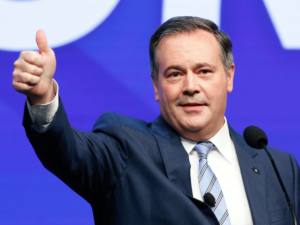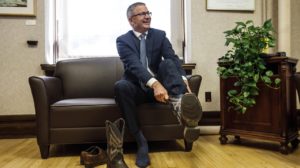Updated 24 February
Opinion
Alberta’s budget context is favorable right now with oil prices at just over $90 U.S. a barrel. A budget surplus, based on resource revenue, is widely expected for fiscal 2022-23. Alberta employment is back to the pre-pandemic levels. (I may have given the GOA the benefit of the doubt here. The December 2021 Statistics Canada Payroll employment, earnings and hours, and job vacancies revealed Alberta payroll employment “had not yet reached pre-COVID levels in December 2021 (-34,400; -1.7%),” This survey can be a better gauge than the Labour Force Survey which is notoriously volatile.
Kenney’s balanced budget approach to hold spending constant or reduce spending has been “rewarded” with the inevitable rebound of Alberta’s oil and gas-dependent economy. In addition, last fall’s flurry of announcements for large investments, mainly by foreign corporations like Amazon Web Services and Dow Chemicals, suggest future economic conditions will be favorable for Alberta. This timing of a return to budget balance is propitious for Kenny who faces a leadership review on April 9th. It also meets the pledge the UCP made in their 2019 election campaign.
I have been following Alberta budgets for 40 years either inside or outside the government. My most vivid memory was being in the gallery watching Lou Hyndman deliver a budget in 1980 or 1981. What struck me the most was as Hyndman progressed down the list of capital spending it was thunderously greeted by PC backbenchers who gleefully pounded on their desks when their constituency was mentioned. Always a constant reminder of the power of the public purse. (In a accompanying piece which reproduces one of Lou Hyndman’s paper he sets out key questions to the caucus on how to manage Alberta’s difficult fiscal situation in the early eighties).
Alberta’s current budgetary situation has faint echoes to what occurred during Ralph Klein’s first term as Premier. Through absolute cuts in spending in the mid-90s, and a slow recovery in oil and, in particular, natural gas prices, remarkably produced burgeoning surpluses soon after he assumed office and then began a debt repayment program.
By my calculations, to February 17th, the average

NYMEX WTI price of oil was $74 U.S since the beginning of the 2021-22 fiscal year starting last April 1. The budget assumption last February was for WTI to trade at an average of $46 U.S. per barrel. For each dollar per barrel, the government expects to collect $230 million extra. If oil continues to average $74 U.S. the additional haul for the province will be $6.4 billion over its original budget estimate, excluding natural gas. Another remaining six weeks of $90 U.S. a barrel will generate an additional $400-million or so. A $90 U.S. a barrel average price for a full fiscal year means an extra $10-billion over the roughly $2.86-billion in the original budget estimate. No wonder, Kenney seems to be gaining confidence by the day. Look forward to quite the propaganda onslaught on Thursday and perhaps early election speculation.
The Fiscal Dilemma
While all of this sounds great for Kenny and his Finance Minister Travis Toews, underneath this improving fiscal situation is a dilemma. A dilemma that successive Alberta political parties have yet to face up to. Since 1965 – 1966, the Alberta budget has never produced a surplus without counting resource revenue (open PDF chart below sourced from Kneebone and Wilkins.) Looked at differently, Alberta taxpayers have only paid 60 to 95 cents on the dollar for their government services. All this while Alberta has remained the lowest tax jurisdiction in Canada and one of the lowest in North America.
Alberta’s vaunted Tax Advantage however is still built on the provincial government’s addiction to revenue from conventional oil and gas and, increasingly, bitumen production. Bitumen production grew strongly in the 2000s and 2010s as new oilsands were developed. Looking forward, oilsands expansion now only promises incremental add-on growth. And this growth will depend increasingly on how Canada’s and Alberta’s environmental regulators examine the cumulative effects of oilsands production.
Alberta’s fiscal dilemma is this: Albertans expect top drawer public services, but also want low taxes. Toews’ dilemma is how to make the province’s finances more stable and sustainable . Countless government reports (Premier’s Council on Economic Strategy, Government response to Financial Management Commission recommendations) and economic studies have recommended allocating portions of resource revenue to savings; either into the Heritage Fund or other stabilization funds. Such recommendations have been strongly resisted by spending ministries, public institutions, and the public who have typically endured the fiscal effects of expansionary spending followed by often ill-advised restraint. Every time there is a period of restraint followed by oil price rises, there is a flurry of catch-up in both capital and program spending.
Revenue Review?

Finance Minister Toews has spoken about a revenue review, perhaps before the next general election scheduled for late May 2023. He promises all options will be on the table including the dreaded sales tax which i have termed the Voldemort of Alberta politics. Sales taxes have the enormous advantage of being very stable sources of revenue, unlike resource revenue. Alberta political parties however are strongly resistant to the idea. For the NDP, the regressive nature of this flat tax is their main concern. For the UCP, currently led by a former Alberta director of the Canadian taxpayers Federation, the notion is heretical. Furthermore, polls of Alberta residents consistently show high levels of disapproval for a sales tax. As long as bitumen and natural gas prices remain high, the necessary public debate will continue to be evaded.
What to look for on Thursday
The government will maintain and even increase its capital spending forecast for this pre-election year. Some crumbs may be thrown at the post-secondary educational system but it won’t be generous. The government’s right flank is vulnerable to Alberta Separatists parties which will split the rural vote, so cuts to the agriculture department may be reversed. Expect the Kenney government to claim credit for the return to balance. It is also possible that Toews may announce a revenue review, but I wouldn’t hold my breath.
NRRR-and-surplusRelated Posts